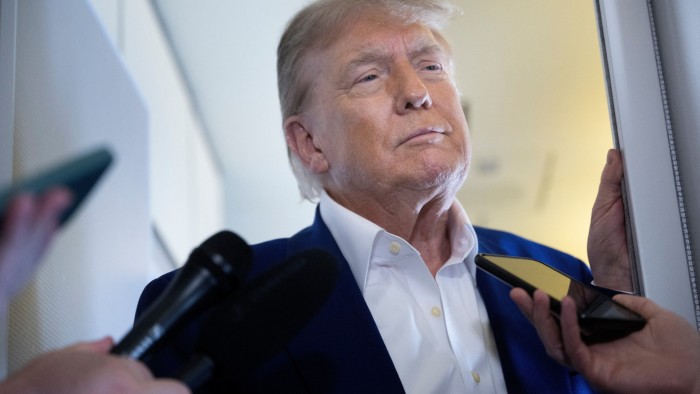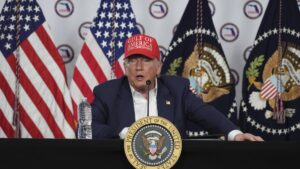
NATO leaders are preparing for a pivotal summit in The Hague on Wednesday, where U.S. President Donald Trump is expected to redefine the alliance’s mutual defense pact. Concerns are mounting that Trump may dilute the U.S. security commitments that have safeguarded Europe for nearly eight decades.
European leaders are hopeful that their pledges to increase national defense spending will persuade Trump to uphold U.S. protection if their countries are attacked. However, Trump’s recent remarks aboard Air Force One have sparked alarm. He suggested that Washington’s commitment to NATO’s Article 5, which underpins the alliance’s mutual defense agreement, “depends on your definition.”
Trump’s assertion that there are “numerous definitions” of Article 5 has cast a shadow over the summit. “I’m committed to being their friends. I’m going to give you an exact definition when I get there,” he stated, leaving European officials uneasy about the future of transatlantic relations.
Uncertainty Looms Over The Hague Summit
Three European officials at the summit told the Financial Times that Trump’s comments have overshadowed an event designed to keep the U.S. engaged in the transatlantic relationship. “The summit rests on what Trump decides,” said one official. “We are all just sat here waiting for him to tell us if he will defend Europe.”
Trump’s statements follow previous threats to defend only those allies that increase their defense spending, a stance that has startled European leaders. Many fear that Russia could exploit any perceived weakness in NATO’s unity.
Efforts to Secure U.S. Commitment
Torrey Taussig, former director of European affairs at the White House National Security Council, noted that Trump’s remarks were “the last thing that NATO Secretary-General Rutte or NATO allies wanted to hear.” The summit has been meticulously planned to secure U.S. commitment to NATO and avoid any confrontations with Trump.
Mark Rutte, in an effort to make the summit more appealing to Trump, has reduced the meeting to a two-and-a-half-hour discussion. He also praised Trump in a private message for pushing Europeans to increase their military spending. “Europe is going to pay in a BIG way, as they should, and it will be your win,” Rutte wrote, a message Trump later shared on social media.
Challenges to Defense Spending Unity
The unity over increased defense spending has been challenged by Spain, which has refused to commit to spending 5% of GDP on defense by 2035. This has led to demands from other governments for flexibility on the target. “Spain’s not agreeing, which is very unfair to the rest of them,” Trump remarked on Air Force One.
Trump added that the U.S. should not bear the same financial burden as “everyone else,” arguing that European defense spending boosts infrastructure. “We don’t have any roads in Europe, we don’t have any bridges in Europe,” he said.
Reassurances and Skepticism
Rutte later assured reporters that he had “no doubt that the U.S. is totally committed to NATO, totally committed to Article 5.” Yet, Rachel Rizzo, a non-resident senior fellow at the Atlantic Council’s Europe Center, expressed skepticism. She noted that Trump had not provided a clear statement affirming his commitment to NATO’s mutual defense pact.
The rest of the alliance was “maybe looking for something they’re just never going to get,” Rizzo said.
The U.S., the largest defense spender in NATO, is an irreplaceable member state. Many European countries rely heavily on its long-range missiles, intelligence, and surveillance assets.
Historical Context and Future Implications
While previous U.S. presidents have urged European allies to increase defense spending, Trump has taken a more aggressive approach by linking U.S. security support to their financial commitments. He has also called for defense spending to be “equalized” between the U.S. and the rest of the alliance, allowing American military assets to focus more on Asia and the Middle East.
“With the Trump administration, everything is a negotiation and everything is on the table,” said Sophia Gaston, a research fellow at King’s College, London. “Anybody who believes anything different is frankly naive.”
The outcome of the summit could have significant implications for NATO’s future and the stability of the transatlantic alliance. As leaders gather in The Hague, the world watches closely to see if Trump’s stance will shift or if longstanding partnerships will be redefined.







